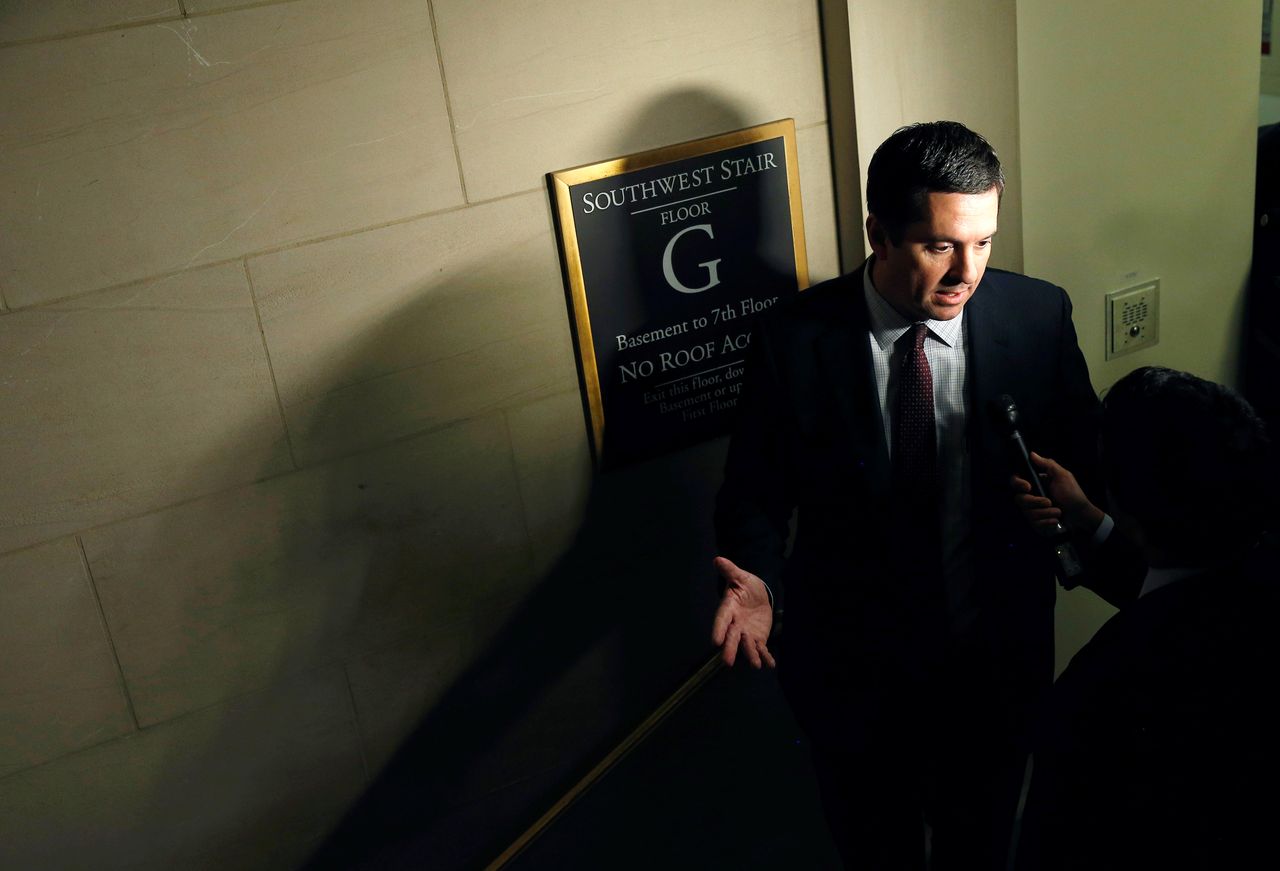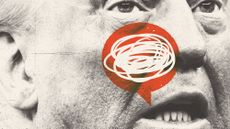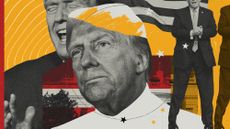The GOP's conspiracy fetishists
Conservatives have lost their minds over the Nunes memo


With Washington waiting worriedly for the imminent publication of the so-called Nunes memo, it's worth taking note of just how far the GOP has sunk into paranoid delusion, soulless cynicism, or both.
It's hard to decide which option is more disturbing: the idea that congressional Republicans actually believe the FBI was doing the bidding of the Democratic Party by using opposition research funded by the Hillary Clinton campaign to get a FISA court to approve surveillance of Trump campaign adviser Carter Page — or that they're just pretending to believe it in order to whip the Republican electorate into a conspiracy-addled froth of indignation against the legitimacy of Special Counsel Robert Mueller's investigation.
In the end, it doesn't make much of a difference. Either way, the GOP has demonstrated that the transformation of the party that began with the rise of talk radio and Fox News in the 1990s has reached a kind of terminus. What was once a sober and serious center-right party is now an organization that actively spreads elaborate webs of lies and half-truths, schemes and plots about its political opponents, and even ostensibly nonpartisan civil servants, for the sake of stirring up anger and undermining the capacity for self-criticism within the Republican electorate.
Subscribe to The Week
Escape your echo chamber. Get the facts behind the news, plus analysis from multiple perspectives.

Sign up for The Week's Free Newsletters
From our morning news briefing to a weekly Good News Newsletter, get the best of The Week delivered directly to your inbox.
From our morning news briefing to a weekly Good News Newsletter, get the best of The Week delivered directly to your inbox.
This will be the case no matter what ends up being revealed or alleged in the memo that Devin Nunes, the other Republican members of the House Intelligence Committee, and the White House so desperately want to make public. Because what will almost certainly not be in the memo is evidence that the law-enforcement organization that so potently torpedoed Hillary Clinton's campaign by reopening the email server investigation less than two weeks before Election Day was seeking to advance the interests of the Democrats at the expense of the Trump administration when it sought permission to conduct (or continue conducting) surveillance of Page.
That's what would need to be in the memo to vindicate the insinuations stirred up by the right and currently swirling around the Mueller investigation. How do I know these insinuations will fail to be vindicated? Because in the real world, as opposed to the world concocted by the Trump administration's water carriers on Capitol Hill, that's not how any of this works.
The FBI knew that the dossier compiled by former British intelligence officer Christopher Steele (and apparently paid for by the Clinton campaign by way of research firm Fusion GPS) was raw intelligence. It is highly implausible (to put it mildly) that the FBI asked a FISA court to issue or renew a warrant for surveillance, let alone that the warrant was granted by that court, based solely on such intelligence without independent verification from other (probably clandestine) sources. That is most likely one reason why the FBI objects so strongly to the release of the Nunes memo — because it highlights the use of material from the Steele dossier in the FISA application without referring to additional corroborating information that was gathered elsewhere and that the FBI can't divulge without the risk of revealing where it came from.
For a long time, the Republican establishment played along with the conspiracy theories bubbling up from the right-wing media only when they found themselves out of power. During the Clinton administration, for example, absurd stories about the supposed murder of Deputy White House Counsel Vince Foster were given legitimacy on the editorial page of The Wall Street Journal, while various other implausible, byzantine accounts of White House intrigue fed the drive to take down the president by any means necessary. (Independent Counsel Ken Starr eventually dug up the requisite pretext in the form of a presidential lie under oath about an extramarital affair with White House intern Monica Lewinisky.) The same thing happened during the latter half of the Obama administration with the ludicrous, interminable Benghazi investigation of Hillary Clinton's tenure at the State Department.
But in between, during the administration of Republican George W. Bush, such conspiracies largely receded into the background, playing little to no role in the Bush presidency or the actions of Congress from 2000 to 2008. This doesn't mean that policy decisions during those years weren't made on the basis of faulty information or highly questionable assumptions. (They certainly were!) But it does mean that the flagrantly implausible insinuations of domestic intrigue on the part of insidious political enemies were far less influential on the right while Bush was in the Oval Office.
Almost immediately after Donald Trump won the White House, this pattern began to be broken. Now a man who launched his political career by furthering a racist conspiracy theory about the first black president in American history had won the White House. It should surprise no one that he brought a conspiratorial way of thinking into the Oval Office — or that these habits of mind quickly spread to members of his party in Congress.
The scandal-soaked, tweet-fueled hothouse of Trump's Washington is the perfect place for conspiracies to thrive — and thrive they have, among members of both parties. Democrats feel angry and demoralized, victims of an electoral system that's stacked against them no less than of an array of domestic (the FBI) and foreign (Vladimir Putin) antagonists. It's hardly surprising that in such an environment, professional BS artists like Louise Mensch, Eric Garland, Claude Taylor, and Andrea Chalupa have had an enormous, and pernicious, influence.
But that's nothing compared to what we now see in the White House and among leading Republicans in Congress (especially in the House). Mensch and Garland are influential among Democrats at large, but they are far from the levers of power. As chair of the House Intelligence Committee, Nunes has one of the most powerful positions in Washington, and he's using this power to spread — and to encourage the right-wing media complex to spread — conspiratorial disinformation in the hopes of shielding the Trump White House from an investigation that could badly damage or bring it down.
He and the rest of his complicit party should be ashamed of themselves — whether or not they believe their own prevarications.
Sign up for Today's Best Articles in your inbox
A free daily email with the biggest news stories of the day – and the best features from TheWeek.com
Damon Linker is a senior correspondent at TheWeek.com. He is also a former contributing editor at The New Republic and the author of The Theocons and The Religious Test.
-
 Is method acting falling out of fashion?
Is method acting falling out of fashion?Talking Points The divisive technique has its detractors, though it has also wrought quite a few Oscar-winning performances
By Anya Jaremko-Greenwold, The Week US Published
-
 'There is a lot riding on the deal for both sides'
'There is a lot riding on the deal for both sides'Instant Opinion Opinion, comment and editorials of the day
By Justin Klawans, The Week US Published
-
 Pharaoh's tomb discovered for first time in 100 years
Pharaoh's tomb discovered for first time in 100 yearsSpeed Read This is the first burial chamber of a pharaoh unearthed since Tutankhamun in 1922
By Peter Weber, The Week US Published
-
 'Seriously, not literally': how should the world take Donald Trump?
'Seriously, not literally': how should the world take Donald Trump?Today's big question White House rhetoric and reality look likely to become increasingly blurred
By Sorcha Bradley, The Week UK Published
-
 Will Trump's 'madman' strategy pay off?
Will Trump's 'madman' strategy pay off?Today's Big Question Incoming US president likes to seem unpredictable but, this time round, world leaders could be wise to his playbook
By Sorcha Bradley, The Week UK Published
-
 US election: who the billionaires are backing
US election: who the billionaires are backingThe Explainer More have endorsed Kamala Harris than Donald Trump, but among the 'ultra-rich' the split is more even
By Harriet Marsden, The Week UK Published
-
 US election: where things stand with one week to go
US election: where things stand with one week to goThe Explainer Harris' lead in the polls has been narrowing in Trump's favour, but her campaign remains 'cautiously optimistic'
By Harriet Marsden, The Week UK Published
-
 Is Trump okay?
Is Trump okay?Today's Big Question Former president's mental fitness and alleged cognitive decline firmly back in the spotlight after 'bizarre' town hall event
By Harriet Marsden, The Week UK Published
-
 The life and times of Kamala Harris
The life and times of Kamala HarrisThe Explainer The vice-president is narrowly leading the race to become the next US president. How did she get to where she is now?
By The Week UK Published
-
 Will 'weirdly civil' VP debate move dial in US election?
Will 'weirdly civil' VP debate move dial in US election?Today's Big Question 'Diametrically opposed' candidates showed 'a lot of commonality' on some issues, but offered competing visions for America's future and democracy
By Harriet Marsden, The Week UK Published
-
 1 of 6 'Trump Train' drivers liable in Biden bus blockade
1 of 6 'Trump Train' drivers liable in Biden bus blockadeSpeed Read Only one of the accused was found liable in the case concerning the deliberate slowing of a 2020 Biden campaign bus
By Peter Weber, The Week US Published